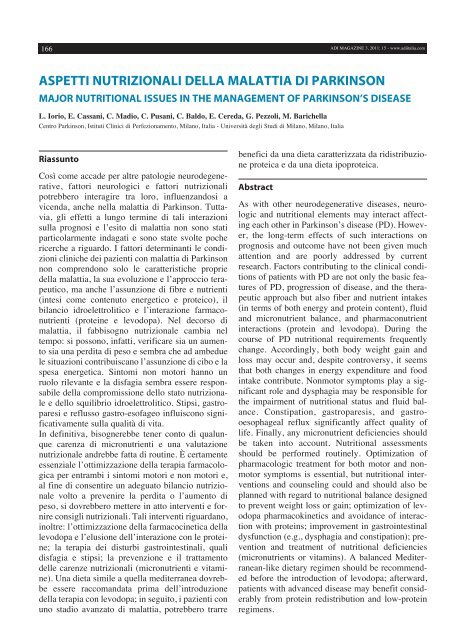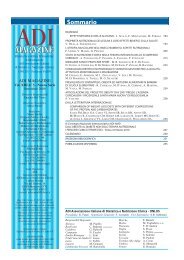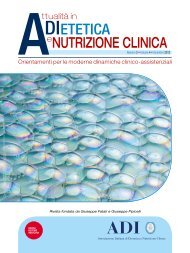nasce la sensibilità al glutine - Adi
nasce la sensibilità al glutine - Adi
nasce la sensibilità al glutine - Adi
Create successful ePaper yourself
Turn your PDF publications into a flip-book with our unique Google optimized e-Paper software.
166<br />
Riassunto<br />
Così come accade per <strong>al</strong>tre patologie neurodegenerative,<br />
fattori neurologici e fattori nutrizion<strong>al</strong>i<br />
potrebbero interagire tra loro, influenzandosi a<br />
vicenda, anche nel<strong>la</strong> ma<strong>la</strong>ttia di Parkinson. Tuttavia,<br />
gli effetti a lungo termine di t<strong>al</strong>i interazioni<br />
sul<strong>la</strong> prognosi e l’esito di ma<strong>la</strong>ttia non sono stati<br />
partico<strong>la</strong>rmente indagati e sono state svolte poche<br />
ricerche a riguardo. I fattori determinanti le condizioni<br />
cliniche dei pazienti con ma<strong>la</strong>ttia di Parkinson<br />
non comprendono solo le caratteristiche proprie<br />
del<strong>la</strong> ma<strong>la</strong>ttia, <strong>la</strong> sua evoluzione e l’approccio terapeutico,<br />
ma anche l’assunzione di fibre e nutrienti<br />
(intesi come contenuto energetico e proteico), il<br />
bi<strong>la</strong>ncio idroelettrolitico e l’interazione farmaconutrienti<br />
(proteine e levodopa). Nel decorso di<br />
ma<strong>la</strong>ttia, il fabbisogno nutrizion<strong>al</strong>e cambia nel<br />
tempo: si possono, infatti, verificare sia un aumento<br />
sia una perdita di peso e sembra che ad ambedue<br />
le situazioni contribuiscano l’assunzione di cibo e <strong>la</strong><br />
spesa energetica. Sintomi non motori hanno un<br />
ruolo rilevante e <strong>la</strong> disfagia sembra essere responsabile<br />
del<strong>la</strong> compromissione dello stato nutrizion<strong>al</strong>e<br />
e dello squilibrio idroelettrolitico. Stipsi, gastroparesi<br />
e reflusso gastro-esofageo influiscono significativamente<br />
sul<strong>la</strong> qu<strong>al</strong>ità di vita.<br />
In definitiva, bisognerebbe tener conto di qu<strong>al</strong>unque<br />
carenza di micronutrienti e una v<strong>al</strong>utazione<br />
nutrizion<strong>al</strong>e andrebbe fatta di routine. È certamente<br />
essenzi<strong>al</strong>e l’ottimizzazione del<strong>la</strong> terapia farmacologica<br />
per entrambi i sintomi motori e non motori e,<br />
<strong>al</strong> fine di consentire un adeguato bi<strong>la</strong>ncio nutrizion<strong>al</strong>e<br />
volto a prevenire <strong>la</strong> perdita o l’aumento di<br />
peso, si dovrebbero mettere in atto interventi e fornire<br />
consigli nutrizion<strong>al</strong>i. T<strong>al</strong>i interventi riguardano,<br />
inoltre: l’ottimizzazione del<strong>la</strong> farmacocinetica del<strong>la</strong><br />
levodopa e l’elusione dell’interazione con le proteine;<br />
<strong>la</strong> terapia dei disturbi gastrointestin<strong>al</strong>i, qu<strong>al</strong>i<br />
disfagia e stipsi; <strong>la</strong> prevenzione e il trattamento<br />
delle carenze nutrizion<strong>al</strong>i (micronutrienti e vitamine).<br />
Una dieta simile a quel<strong>la</strong> mediterranea dovrebbe<br />
essere raccomandata prima dell’introduzione<br />
del<strong>la</strong> terapia con levodopa; in seguito, i pazienti con<br />
uno stadio avanzato di ma<strong>la</strong>ttia, potrebbero trarre<br />
benefici da una dieta caratterizzata da ridistribuzione<br />
proteica e da una dieta ipoproteica.<br />
Abstract<br />
ADI MAGAZINE 3, 2011; 15 - www.adiit<strong>al</strong>ia.com<br />
ASPETTI NUTRIZIONALI DELLA MALATTIA DI PARKINSON<br />
MAJOR NUTRITIONAL ISSUES IN THE MANAGEMENT OF PARKINSON’S DISEASE<br />
L. Iorio, E. Cassani, C. Madio, C. Pusani, C. B<strong>al</strong>do, E. Cereda, G. Pezzoli, M. Barichel<strong>la</strong><br />
Centro Parkinson, Istituti Clinici di Perfezionamento, Mi<strong>la</strong>no, It<strong>al</strong>ia - Università degli Studi di Mi<strong>la</strong>no, Mi<strong>la</strong>no, It<strong>al</strong>ia<br />
As with other neurodegenerative diseases, neurologic<br />
and nutrition<strong>al</strong> elements may interact affecting<br />
each other in Parkinson’s disease (PD). However,<br />
the long-term effects of such interactions on<br />
prognosis and outcome have not been given much<br />
attention and are poorly addressed by current<br />
research. Factors contributing to the clinic<strong>al</strong> conditions<br />
of patients with PD are not only the basic features<br />
of PD, progression of disease, and the therapeutic<br />
approach but <strong>al</strong>so fiber and nutrient intakes<br />
(in terms of both energy and protein content), fluid<br />
and micronutrient ba<strong>la</strong>nce, and pharmaconutrient<br />
interactions (protein and levodopa). During the<br />
course of PD nutrition<strong>al</strong> requirements frequently<br />
change. Accordingly, both body weight gain and<br />
loss may occur and, despite controversy, it seems<br />
that both changes in energy expenditure and food<br />
intake contribute. Nonmotor symptoms p<strong>la</strong>y a significant<br />
role and dysphagia may be responsible for<br />
the impairment of nutrition<strong>al</strong> status and fluid ba<strong>la</strong>nce.<br />
Constipation, gastroparesis, and gastrooesophage<strong>al</strong><br />
reflux significantly affect qu<strong>al</strong>ity of<br />
life. Fin<strong>al</strong>ly, any micronutrient deficiencies should<br />
be taken into account. Nutrition<strong>al</strong> assessments<br />
should be performed routinely. Optimization of<br />
pharmacologic treatment for both motor and nonmotor<br />
symptoms is essenti<strong>al</strong>, but nutrition<strong>al</strong> interventions<br />
and counseling could and should <strong>al</strong>so be<br />
p<strong>la</strong>nned with regard to nutrition<strong>al</strong> ba<strong>la</strong>nce designed<br />
to prevent weight loss or gain; optimization of levodopa<br />
pharmacokinetics and avoidance of interaction<br />
with proteins; improvement in gastrointestin<strong>al</strong><br />
dysfunction (e.g., dysphagia and constipation); prevention<br />
and treatment of nutrition<strong>al</strong> deficiencies<br />
(micronutrients or vitamins). A ba<strong>la</strong>nced Mediterranean-like<br />
dietary regimen should be recommended<br />
before the introduction of levodopa; afterward,<br />
patients with advanced disease may benefit considerably<br />
from protein redistribution and low-protein<br />
regimens.





